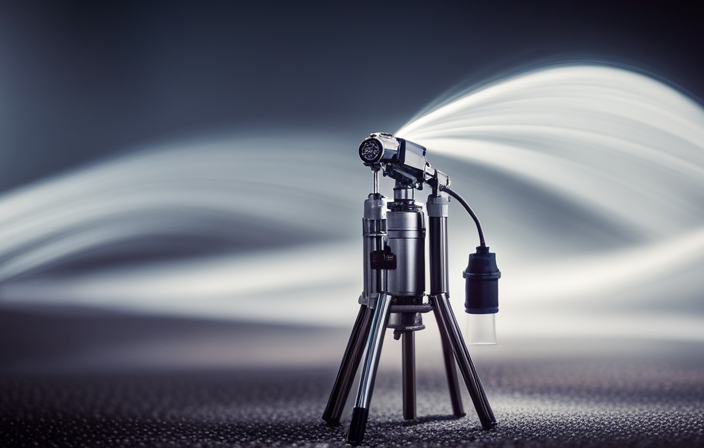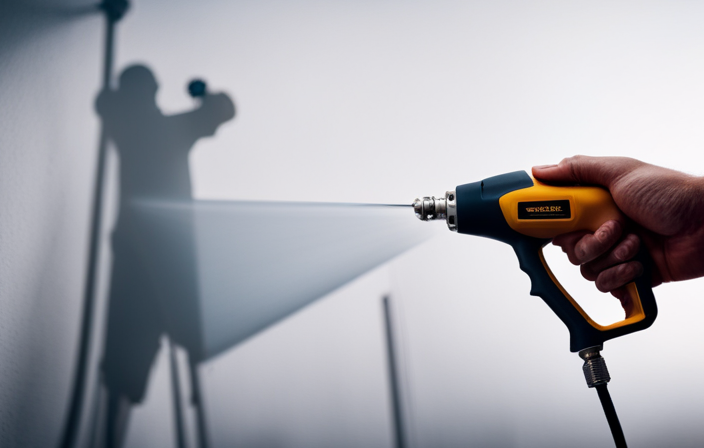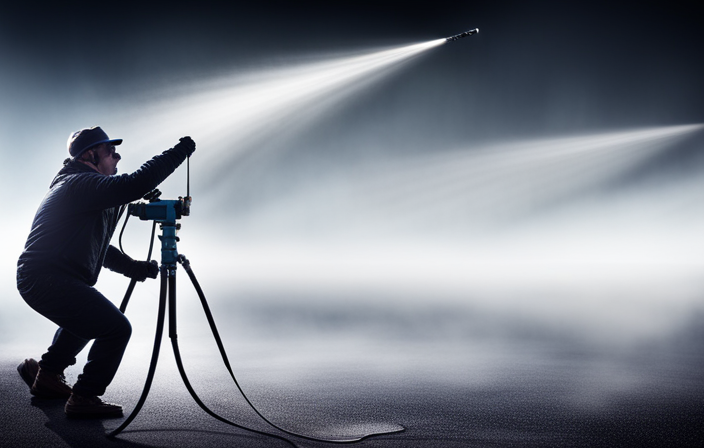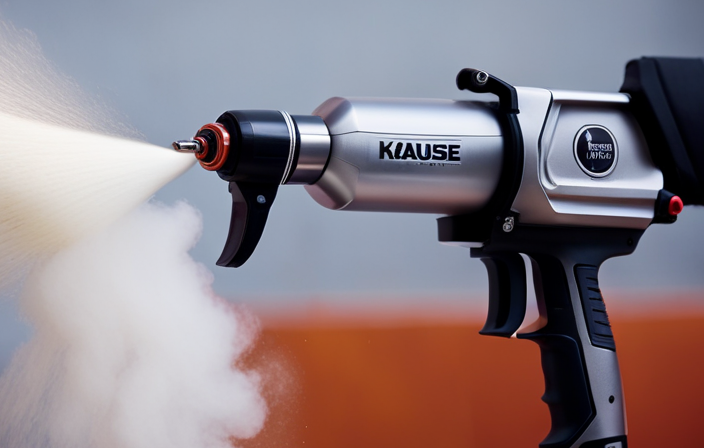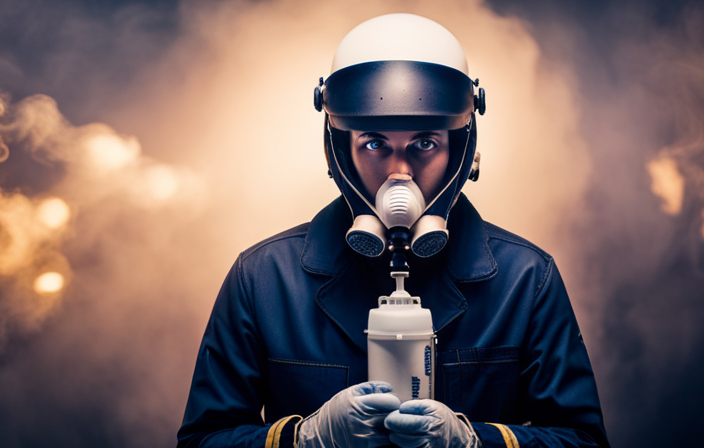While holding the airless paint sprayer, poised to apply a seamless and impeccable layer of paint, I was startled by a harsh noise. It seemed like the sprayer was having difficulty, on the verge of clogging, as it tried to propel the paint out of its nozzle.
Frustration and confusion filled my mind as I wondered what could be causing this issue. Determined to find a solution, I delved into the world of troubleshooting and discovered common causes for this problem. From clogs in the spray tip to air leaks and incorrect pressure settings, each factor played a role in the sprayer’s performance.
Armed with knowledge and a desire to conquer this challenge, I began inspecting, adjusting, and cleaning various components of the sprayer. In this article, I will share my findings and provide detailed steps to help you resolve the issue when your airless paint sprayer sounds like it wants to lock up when spraying paint.
Key Takeaways
- Regular maintenance and cleaning of the airless paint sprayer can prevent issues like locking up while spraying paint.
- If following recommended troubleshooting steps doesn’t resolve the issue, it is important to seek professional assistance.
- Unusual sounds or vibrations during operation of the sprayer may indicate a problem that requires professional attention.
- Professional assistance ensures efficient and effective resolution of problems, saving time and preventing potential damage.
Common Causes of the Problem
When your airless paint sprayer starts making strange sounds and acting like it’s about to seize up, it’s usually due to common causes that can easily be addressed.
One potential solution is to check the sprayer’s motor. If it sounds like it wants to lock up, it could be because the motor is experiencing resistance or overheating. In this case, you can try troubleshooting tips such as cleaning or replacing the motor’s brushes, checking for any loose connections, or ensuring that the motor is properly lubricated.
Another common cause of this issue is a clogged spray tip. To check for clogs, remove the tip and inspect it for any debris or buildup. If you find any, clean it thoroughly before reattaching it.
By addressing these common causes, you can resolve the problem and continue painting smoothly.
Check for Clogs in the Spray Tip
To troubleshoot the issue, you can quickly check for any clogs in the spray tip of your airless paint sprayer. Here’s how:
- Start by removing the spray tip from the gun. Inspect it closely for any visible blockages or debris.
- If you notice any clogs, use a small brush or toothpick to carefully remove the obstruction.
Next, determine the nozzle size of your spray tip. Refer to the manufacturer’s instructions or check the markings on the tip itself.
Make sure that you are using the correct nozzle size for the type of paint you are spraying. Using an incorrect size can cause the sprayer to struggle and make strange sounds.
Once you have checked for clogs and determined the correct nozzle size, reattach the spray tip and test the sprayer again. If the problem persists, it may be necessary to inspect the paint filter.
Inspecting the paint filter can help identify any additional issues that may be causing the sprayer to lock up.
Inspect the Paint Filter
Inspect your paint filter to uncover any hidden issues that could be causing your sprayer to seize. The paint filter is essential for a smooth flow of paint. Remove the filter and carefully examine it for clogs or debris. Clean the filter thoroughly to remove any paint residue or particles that could cause the sprayer to lock up. If the filter is damaged or excessively dirty, replace it. By addressing paint filter issues, you can prevent your sprayer from seizing up and achieve better results.
Now, let’s move on to checking the pressure setting and making necessary adjustments.
Check the Pressure Setting
Imagine yourself as a curious explorer, ready to uncover the secrets of your paint sprayer. Now, let’s delve into the mysterious world of pressure settings and unleash the true potential of your masterpiece machine. When your airless paint sprayer sounds like it wants to lock up while spraying paint, it’s crucial to check the pressure setting. This setting determines the force at which the paint is expelled, and an incorrect setting can lead to various issues. To ensure optimal performance, refer to the user manual for recommended pressure ranges based on your specific paint type. Additionally, check for proper ventilation in your workspace to prevent the paint from becoming too thick or thin. Troubleshoot paint consistency by adjusting the pressure accordingly. By mastering the art of pressure settings, you’ll be one step closer to achieving flawless paint results. Now, let’s explore how to clean or replace the pump filter.
Clean or Replace the Pump Filter
When it comes to maintaining the peak performance of your paint sprayer, cleaning or replacing the pump filter is crucial. The pump filter acts as a barrier, preventing debris from clogging the system and causing the sprayer to lock up.
To clean the pump filter, follow these steps:
- Turn off and unplug the sprayer.
- Remove the filter from the pump.
- Rinse the filter thoroughly with water to remove any accumulated paint or dirt.
If the filter is damaged or excessively dirty, it may need to be replaced.
Regularly cleaning or replacing the pump filter ensures that your paint sprayer operates smoothly and efficiently.
Now, let’s move on to the next section and discuss how to ensure proper lubrication of moving parts.
Ensure Proper Lubrication of Moving Parts
After cleaning or replacing the pump filter, it’s important to ensure proper lubrication of the airless paint sprayer’s moving parts. Regular maintenance is crucial to keep the sprayer functioning smoothly and prevent it from locking up while spraying paint.
Lubricating the moving parts reduces friction and wear, allowing the sprayer to operate efficiently. When choosing a lubricant, it’s essential to select one specifically designed for airless paint sprayers. These lubricants are formulated to withstand the high pressure and continuous use of the sprayer, providing optimal performance and longevity.
Applying the lubricant to key areas such as the piston, ball bearings, and seals will keep the sprayer running smoothly and prevent any potential issues.
Now, let’s transition to the next section and discuss how to check for air leaks.
Check for Air Leaks
Checking for air leaks is an important step to ensure optimal performance of your airless paint sprayer. Air leaks can cause the sprayer to sound like it wants to lock up when spraying paint. To troubleshoot this issue, start by inspecting all the connections and fittings for any signs of leakage. Tighten any loose connections and replace any damaged parts if necessary.
Additionally, check the spray gun and hose for any cracks or holes that could be causing air to escape. By ensuring a tight seal and preventing air leaks, you can improve the efficiency and effectiveness of your paint sprayer.
Next, we will discuss how to adjust the spray pattern for better results.
Adjust the Spray Pattern
To achieve better results, it’s crucial to adjust the spray pattern of your paint sprayer. This troubleshooting tip can make a significant difference in the outcome of your paint job.
First, check the nozzle size on your sprayer. If it’s too small, it may cause clogging and uneven spray patterns. Consider using a larger nozzle size for better coverage.
Next, ensure that the sprayer’s pressure is set correctly. Too much pressure can create overspray, while too little can lead to uneven application.
Lastly, adjust the fan width to match the surface you’re painting. A narrower fan width is ideal for smaller areas, while a wider fan width works best for larger surfaces.
By following these tips and adjusting the spray pattern, you can achieve a smoother and more professional finish.
Moving forward, let’s explore the importance of using the correct tip size.
Use the Correct Tip Size
After adjusting the spray pattern, the next step in troubleshooting an airless paint sprayer that sounds like it wants to lock up when spraying paint is to ensure you are using the correct tip size. Using the wrong tip size can cause a variety of issues, including excessive pressure buildup and clogging.
It is important to refer to the manufacturer’s guidelines or consult an expert to determine the appropriate tip size for the type of paint you are using. Proper maintenance of your sprayer is also crucial in preventing any potential problems. Regularly cleaning and inspecting the tip for any damage or wear is essential. Additionally, ensuring that the sprayer is properly lubricated and all connections are tight will help maintain its optimal performance.
If despite these troubleshooting techniques the issue persists, it may be necessary to seek professional assistance.
Seek Professional Assistance if Needed
If the issue persists despite troubleshooting techniques, it may be necessary to seek professional assistance.
Knowing when to DIY and when to call a professional is important when dealing with airless paint sprayers. While some minor issues can be resolved on your own, more complex problems may require the expertise of a professional.
When it comes to troubleshooting tips for airless paint sprayers, it is crucial to determine the limits of your knowledge and abilities. If you have followed all the recommended troubleshooting steps and the sprayer still sounds like it wants to lock up when spraying paint, it is time to reach out to a professional.
They have the experience and specialized tools to accurately diagnose and fix the issue. This ensures that your paint sprayer is working properly and prevents any further damage.
Frequently Asked Questions
How do I determine if there are any air leaks in the airless paint sprayer?
To detect air leaks in an airless paint sprayer, troubleshoot uneven spray patterns. Regular maintenance and filter replacement can help prevent leaks. Ensure compatibility of paint types with the sprayer. Use recommended lubricants for optimal performance.
What should I do if the spray pattern is not even or consistent?
To achieve a smooth finish with an airless paint sprayer, it is important to maintain a consistent spray pattern. Techniques like adjusting the pressure, holding the sprayer at the correct distance, and using overlapping strokes can improve the spray pattern. Common mistakes to avoid include spraying too quickly or too close to the surface. If the spray pattern is not even or consistent, troubleshooting steps may include checking for clogs, ensuring proper paint viscosity, and inspecting the spray tip for wear or damage.
How often should I clean or replace the pump filter in an airless paint sprayer?
To improve the performance of my airless paint sprayer, I can clean or replace the pump filter regularly. It is recommended to clean the filter after every use or replace it if it is damaged. As for using a different type of filter, it is important to consult the manufacturer’s guidelines to ensure compatibility and optimal performance.
Can I use any type of paint with an airless paint sprayer?
I love using my airless paint sprayer because it can handle all types of paint! From latex to oil-based, it’s versatile. If you encounter any issues, like paint clogging or uneven spray, I can help troubleshoot common problems.
Is there a specific lubricant that should be used for the moving parts of an airless paint sprayer?
Yes, there is a specific lubricant that should be used for the moving parts of an airless paint sprayer. It is important to use the correct lubricant to ensure smooth operation and prevent any potential issues.
Conclusion
If your airless paint sprayer sounds like it wants to lock up when spraying paint, there are a few possible causes for this issue. One common cause is a clog in the sprayer. To troubleshoot this, you can try clearing any clogs by running water or a cleaning solution through the sprayer. Another potential cause is a problem with the paint filter. Inspecting the filter and cleaning or replacing it if necessary can help resolve this issue. Additionally, adjusting the pressure setting on the sprayer may help alleviate any locking up or struggling sounds. It’s also important to check for any air leaks in the sprayer, as these can affect its performance. Cleaning or replacing the pump filter can help address this problem. Lastly, make sure you are using the correct tip size for the paint you are spraying, and adjust the spray pattern as needed for optimal results. If you have tried all of these troubleshooting steps and the issue persists, it may be time to seek professional assistance. They will be able to diagnose and fix any underlying problems with your paint sprayer, ensuring that it is back to its efficient and reliable self in no time.
